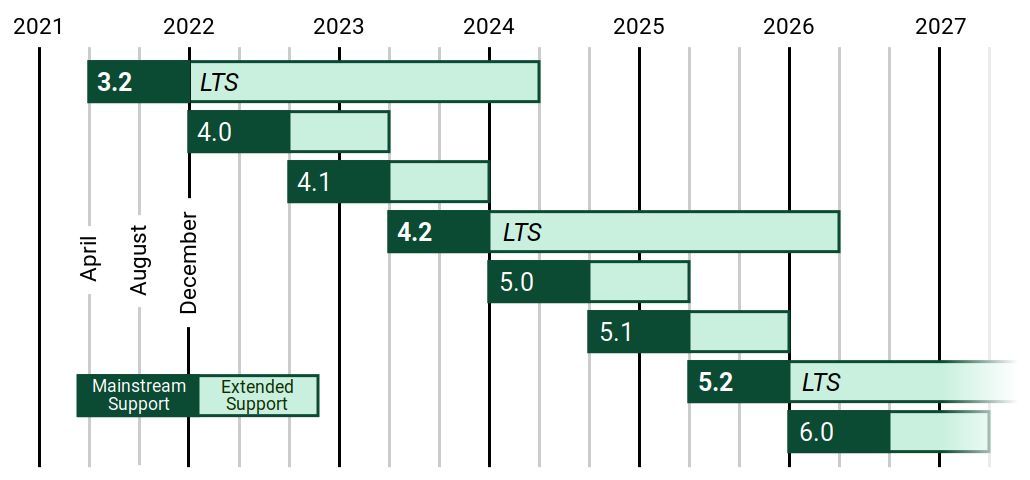Django
framework python-runtimeDjango is a high-level Python Web framework that encourages rapid development and clean, pragmatic design.

| Release | Python | Released | Active Support | Security Support | Latest |
|---|---|---|---|---|---|
| 5.0 | 3.10 - 3.12 | 4 months and 3 weeks ago (04 Dec 2023) |
Ends
in 4 months (31 Aug 2024)
|
Ends
in 1 year (30 Apr 2025)
|
5.0.4
(03 Apr 2024)
|
| 4.2 (LTS) | 3.8 - 3.12 (added in 4.2.8) | 1 year ago (03 Apr 2023) |
Ended
4 months and 3 weeks ago (04 Dec 2023)
|
Ends
in 2 years (30 Apr 2026)
|
4.2.11
(04 Mar 2024)
|
| 4.1 | 3.8 - 3.11 (added in 4.1.3) | 1 year and 8 months ago (03 Aug 2022) |
Ended
1 year ago (05 Apr 2023)
|
Ended
4 months and 4 weeks ago (01 Dec 2023)
|
4.1.13
(01 Nov 2023)
|
| 4.0 | 3.8 - 3.10 | 2 years and 4 months ago (07 Dec 2021) |
Ended
1 year and 8 months ago (03 Aug 2022)
|
Ended
1 year ago (01 Apr 2023)
|
4.0.10
(14 Feb 2023)
|
| 3.2 (LTS) | 3.6 - 3.10 (added in 3.2.9) | 3 years ago (06 Apr 2021) |
Ended
2 years and 4 months ago (07 Dec 2021)
|
Ended
3 weeks and 5 days ago (01 Apr 2024)
|
3.2.25
(04 Mar 2024)
|
| 3.1 | 3.6 - 3.9 (added in 3.1.3) | 3 years and 8 months ago (04 Aug 2020) |
Ended
3 years ago (06 Apr 2021)
|
Ended
2 years and 4 months ago (07 Dec 2021)
|
3.1.14
(07 Dec 2021)
|
| 3.0 | 3.6 - 3.9 (added in 3.0.11) | 4 years ago (02 Dec 2019) |
Ended
3 years and 8 months ago (03 Aug 2020)
|
Ended
3 years ago (06 Apr 2021)
|
3.0.14
(06 Apr 2021)
|
| 2.2 (LTS) | 3.5 - 3.9 (added in 2.2.17) | 5 years ago (01 Apr 2019) |
Ended
4 years ago (02 Dec 2019)
|
Ended
2 years ago (11 Apr 2022)
|
2.2.28
(11 Apr 2022)
|
| 2.1 | 3.5 - 3.7 | 5 years and 9 months ago (01 Aug 2018) |
Ended
5 years ago (01 Apr 2019)
|
Ended
4 years ago (02 Dec 2019)
|
2.1.15
(02 Dec 2019)
|
| 2.0 | 3.4 - 3.7 | 6 years ago (02 Dec 2017) |
Ended
5 years and 9 months ago (01 Aug 2018)
|
Ended
5 years ago (01 Apr 2019)
|
2.0.13
(12 Feb 2019)
|
| 1.11 (LTS) | 2.7 - 3.7 (added in 1.11.17) | 7 years ago (04 Apr 2017) |
Ended
6 years ago (02 Dec 2017)
|
Ended
4 years ago (01 Apr 2020)
|
1.11.29
(04 Mar 2020)
|
Feature releases (A.B, A.B+1, etc.) will happen roughly every eight months. These releases will contain new features, improvements to existing features, and such. These can include documented backwards incompatibilities where a deprecation path isn’t possible or not worth the cost.
Patch releases (A.B.C, etc.) will be issued as needed, to fix bugs and/or security issues. These releases will be 100% compatible with the associated feature release, unless this is impossible for security reasons or to prevent data loss. So the answer to “should I upgrade to the latest patch release?” will always be “yes.”
The last feature release for a major version will be designated as long-term support (LTS) release. These releases will get security and data loss fixes applied for a guaranteed period of time, typically three years. Deprecations started in an LTS release (say X.2) will be dropped in a non-dot-zero release (Y.1).
See the supported versions policy for detailed guidelines about what fixes will be backported.
More information is available on the Django website.
You should be running one of the supported release numbers listed above in the rightmost column.
python -c "import django; print(django.get_version())"
You can submit an improvement to this page
on GitHub
![]() .
This page has a corresponding
Talk Page.
.
This page has a corresponding
Talk Page.
A JSON version of this page is available at /api/django.json. See the API Documentation for more information. You can subscribe to the iCalendar feed at /calendar/django.ics.